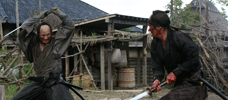Reviews
Michael Barnett
USA, 2011
Credits
Review by Victoria Large
Posted on 26 May 2011
Source projected DVD
Categories The 2011 Independent Film Festival Boston
While the subjects of Matthew Ogens’ Confessions of a Superhero (a film that follows four costumed buskers on the Hollywood Walk of Fame) focus on credibly dressing the part of Superman or Batman, the men and women in Michael Barnett’s new documentary Superheroes aim to go several steps further. Barnett profiles people who have created personas of their own and who are doing their best to be “real life superheroes,” by taking real action in their cities and towns. In the wake of ultraviolent superhero satires like Kick Ass and James Gunn’s hugely disturbing Super, viewers might feel justified in being concerned over where such crime fighting endeavors might lead. Yet none of Barnett’s subjects stray into the Travis Bickle territory traversed by Gunn’s characters in Super, and Barnett avoids the mocking tone that he could easily have gone for here.
The film includes interviews with numerous individuals laying claim to the title of real life superhero. One of the most memorable is Master Legend, a Florida resident whose outsized persona comes across as humorous at first. Yet Master Legend’s story gains bittersweet resonance as the film goes on. He’s an alcoholic who grew up in a horrifically abusive household, but his life as a self-appointed superhero has offered him a kind of salvation.
Barnett’s interviews with Mr. Xtreme, a costumed crusader who patrols the streets of San Diego, reveal a similar blend of sadness and left-of-center nobility. Mr. Xtreme generally patrols alone, and while he rarely finds himself directly confronted by criminals, he describes himself as a visual deterrent. (Vigilante Spider, a young man inspired by the “Mangaverse Spiderman” occasionally joins Mr. Xtreme. The wet patch that forms around Vigilante Spider’s fabric-covered mouth is one of the film’s oddest, and most oddly touching, images.) Mr. Xtreme’s lonely quest for justice gains melancholy poignancy when contrasted with his more ordinary troubles: he works multiple jobs by day and at one stage of the film he is living out of his van.
A number of the real life superheroes, including Mr. Xtreme, take the 1964 murder of Kitty Genovese - which has (rightly or wrongly) come to symbolize the potentially tragic consequences of citizens failing to intervene in a crime - as a call to action. Again and again, Barnett’s subjects express their dissatisfaction with the effectiveness of law enforcement and government, and echo the conviction that more needs to be done to help their fellow men and women. Yet while Barnett is sympathetic to his subjects’ claims, he tempers them with interviews with law enforcement officials who express concern over the safety of the self-appointed superheroes, and he doesn’t shy away from showing the potentially dangerous behavior of some of the costumed crusaders. An extended montage finds various real life superheroes showing off their sometimes-scary arsenals of weapons, and there are a number of scenes that highlight the perils of the world of citizen crime fighters.
Among the most complicated individuals interviewed are the members of the New York Initiative. The group engages in some truly dangerous behavior - including walking alone in dangerous neighborhoods as “muggable” characters - but they also do some concrete good deeds. Zimmer, an openly gay member of the team, is shown walking around a tough neighborhood in a flamboyant outfit, ready to fight back against muggers and homophobes. It’s a case of good intentions and questionable methods, but the real twist is that the fishnet-clad EMT-in-training ends up coming to the aid of a homeless man who has been hit by a car. At times like that, it’s hard not to view the New York Initiative with a curious mixture of admiration and worry.
When interviewed for the film, Marvel Comics legend Stan Lee states his own ambivalence on the subject of real life superheroes. Like many audience members will surely be, he’s “a bit worried” about someone getting hurt. The Spiderman creator cites the obvious—unlike his characters, these people do not have super powers.
But Barnett movingly highlights the ways that real life superheroes can offer help without being bitten by a radioactive arachnid. A well-spoken young man in a black mask going by the superhero alias Life is one of a number of real life superheroes dedicated to community outreach such as offering much-needed supplies to the homeless. Similarly, a Canadian masked man going by the name of Thanatos describes himself as a “parody of Death,” because he spends his time working to keep the disenfranchised alive with food, water, and other essential items. One memorable segment finds a number of real life superheroes distributing supplies to the homeless a mile away from the fantasy world of San Diego Comic Con. At times like that, Superheroes is gently inspiring, serving as a reminder of the real powers that individuals have to help others.
Yet while it is evenhanded and even affectionate, Superheroes is not a hagiography or recruitment film. Barnett reports on a multilayered subculture with appropriate complexity, showing us a world that is sometimes unsettling, sometimes silly, and sometimes kind of wonderful. The documentary didn’t inspire met to suit up with my own secret identity, but I did leave the film feeling like I had a better understanding of those that do.
More The 2011 Independent Film Festival Boston
-

13 Assassins
2010 -

Ivan & Ivana
2011 -

Being Elmo: A Puppeteer’s Journey
2011 -

Bellflower
2011 -

Convento
2011 -

Cure for Pain: The Mark Sandman Story
2011 -

The Trip
2010 -

El Bulli
2010 -

Submarine
2010 -

Stake Land
2010 -

Another Earth
2010 -

If a Tree Falls
2011 -

Terri
2011 -

The City Dark
2011 -

Littlerock
2010 -

Superheroes
2011 -

Hot Coffee
2011 -

Conan O’Brien Can’t Stop
2011
We don’t do comments anymore, but you may contact us here or find us on Twitter or Facebook.



